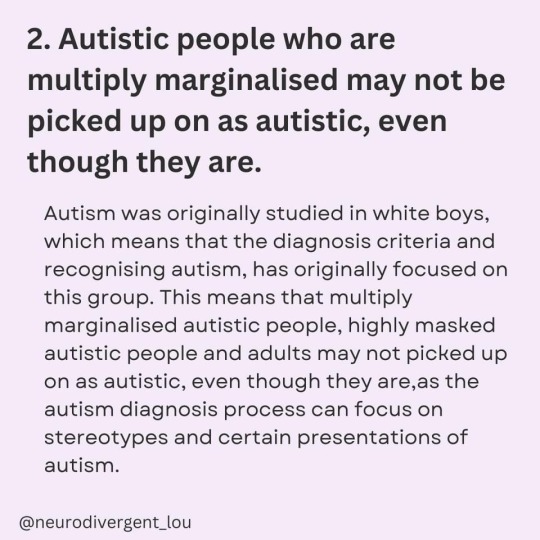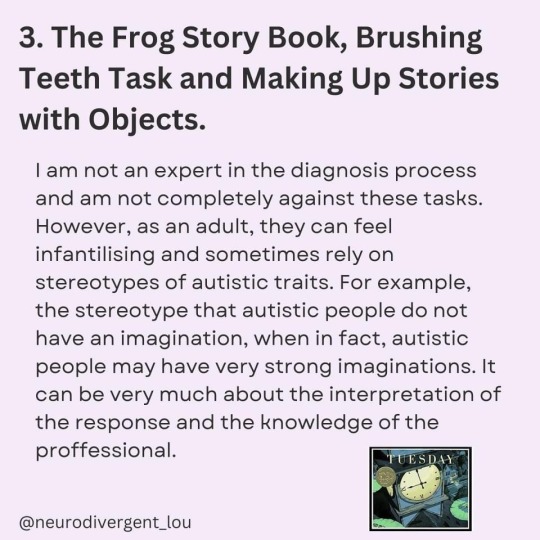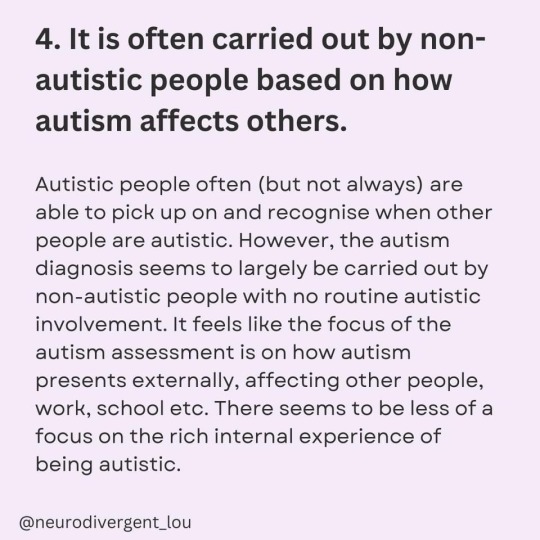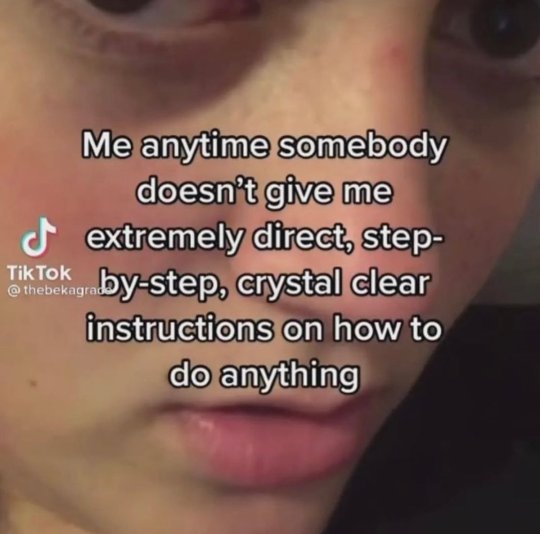Text
I KNOW RIGHT I STAMMERED AND STUMBLED MY WAY THROUGH IT AND FULLY DID NOT GESTURE I JUST TALKED
LIKE MY DUDE I AM TWENTY FREAKIN YEARS OLD
i thought the pretending to brush my teeth thing was a myth⁉️
3 notes
·
View notes
Text
well well well if it isn’t my own mental illness coming to mentally ill me
52K notes
·
View notes
Note
someone said in a story on their instagram, she is also autistic, but she said:
"its actually insane that the biggest disabling thing about autism, something we ALL experience, is sensitivity to sensory stimuli, understimulation and overstimulation."
is that true that we ALL have a sensitivity to those things?
but also a stupid question, its probably been asked before but i have missed it, what is sensory stimuli? and how does it show up as a sensitivity? if that second question even makes sense, like how do you know you are sensitive to it?
Oh, I love this question.
So, the short answer is: no, not all autistics have difficulties with sensory input. However, it is so common that it is part of the autism criteria.
Now, the explanation:
I'll link the full criteria at the end of this, but to keep this simple, sensory issues are a part of Criteria B of the autism assessment.
Criteria B requires 2 out of 4 to be there. The 4 possible criteria are:
Stereotyped or repetitive motor movements, use of objects, or speech.
Insistence on sameness, inflexible adherence to routines, or ritualized patterns of verbal or nonverbal behavior.
Highly restricted, fixated interests that are abnormal in intensity or focus.*
Hyper- or hypo-reactivity to sensory input or unusual interest in sensory aspects of the environment.
I meet all 4 criteria. Some autistics meet only 2 or 3.
* I hate the use of "abnormal" in this criterion, but I kept the wording exact.
Now, what is sensory stimuli?
Basically, anything that interacts with your senses.
Food cooking, lights, the sound of the TV, your clothing on your skin etc. These are all sensory input.
Everyone has a threshold of sensory sensitivity. But, autistics often have an extremely low threshold for this. So, whilst an allistic (non-autistic) can watch TV, and handle the sound of the microwave beeping, an autistic may be unable to handle those two sounds co-occurring.
Those with hypersensitivity often describe it as a physical pain.
There is also sensory hyposensitivity, where the autistic person struggles to get enough input from a specific sense and they will try more extreme activities to try to get stimulation.
Many Autistics experience both of these states for different reasons.
This is where stimming comes into play. Stimming lets us drown out unwanted stimulation or add stimulation.
Feel free to ask me more!
81 notes
·
View notes
Note
hey, I'm in the process of getting an autism diagnosis (I hope) and I should know at the end of January whether they diagnose me or not. do you have any tips for managing the stress around waiting for a diagnosis, or any suggestions of questions to ask them at the feedback appointment? I don't really know what I'm doing, it was only suggested I might have autism in October when I had to be briefly hospitalised and it was after that that I started down this path. (I'm Australian)
Hi! I'm in Australia, too.
Firstly, I don't have any recommendations for the wait period, as even I suffered when I waited for my assessment. Some people will tell you to research autism, but that wasn't something I did as I was scared to learn too much only to be told I wasn't autistic (that wasn't the case, obviously).
My assessment was 3 hours long, but different places will have different requirements such as dual assessments or different testing.
You will also want to ask about the NDIS and/or disability pension. There are upcoming changes to the NDIS that will change the criteria of who can join it, how much they get etc, but I don't know the full details yet.
You'll be given a level at diagnosis, which you may want to ask more about. As well as ask what therapies are available to you such as occupational therapy, speech therapy etc.
Get the assessor's email address, too, so that you can send any questions afterwards. Be sure to request a copy of your assessment report (some charge extra for this, however).
This is all I can think of at the top of my head, but others can add more!
#I am truly most worried about if they say 'nope not autistic' tbh#I believe I should get the assessment report I think that's what I'm paying for LOL#I had a few appointments already and will hopefully be given the report at end of Jan#(I'm anon btw)
18 notes
·
View notes
Text

personally, i only found one recipe in here to try out, but i loved the general tips on cooking to achieve particular colors, tastes, or textures. there’s worksheets for figuring out your aversions that can also be used as communication aids for nonverbal ppl.
recipes all have their colors, tastes, and textures labeled right up top, so you know if it suits your needs right away. the author is autistic and has an extremely nonjudgmental way of writing about picky eating.
12K notes
·
View notes
Note
Autistic culture is getting really upset when someone does something the wrong way (especially using your stuff) and then either feeling uncomfy the rest of the day because you said nothing or crying because they got angry at you for being upset they did something a bad way :(
.
141 notes
·
View notes
Text
Does anyone have any recommendations for phone applications that help one to identify emotions or feelings? @autistic-af tagging because I feel like I remember you mentioning such an application sometime. Hope you don't mind the tag! -Wren
71 notes
·
View notes
Text
Sometimes I get sensory problems with chewing. It's not terrible, but it does make eating or drinking unpleasant because it feels gritty. I don't know why. I do have terrible dental hygiene but there doesn't seem to be a direct connection. The act of closing my jaw is sensorily unpleasant during these times. I'm experiencing it right now; it might be a week or so, then it's likely to go away. It varies. But it does make eating or drinking harder, which then interacts badly with the eating disorder I'm trying to recover from (likely anorexia). And then it also does bad things with my ever-present depression. It sounds worse on paper than in real life; it really isn't too bad. Anyway, does anyone have any suggestions for what I should do?
0 notes
Text
I can't remember who recommended the Animi app to me but thank you!
I've only been using it for 2 days, but both times I actually figured out my emotions!

(My hubby calls my autism my peanut)
So basically, the app lets you figure out your emotions either via a bodily sensation or via an emotional map.



I prefer the emotional compass, but I'm new to it.
It then let's you track your emotions in a diary or use breathing exercises to regulate.
I haven't done the exercises yet, but I'm just so damn thrilled to have a word for my emotion!
Oh, just a slight warning that the app does use some AI-like art that I found visually disturbing. It was just bright and weird.
405 notes
·
View notes
Text
Does anyone have any recommendations for phone applications that help one to identify emotions or feelings? @autistic-af tagging because I feel like I remember you mentioning such an application sometime. Hope you don't mind the tag! -Wren
71 notes
·
View notes
Text
I want to crochet and I want to read my book and I want to colour in and I want to listen to my favourite music and I want to listen to that podcast I started and never finished and I want to watch all the videos I've save to my 'Watch Later' and I want to bake something and I want to learn something new and I want to watch my favourite movie and I want to do all of these things but I get so overwhelmed and instead I do none of it what the actual fuck.
7 notes
·
View notes
Text
things i've experienced at mostly food service or customer service workplaces as an autistic adult:
overworking myself because i feel a need to be perfect so that no one will get upset with me
making dumb mistakes like misreading labels and occasionally forgetting an ingredient bc my brain is moving so fast and also having 394485 thougts at once while trying to fit in and mask (and failing to do so miserably so its all for nothing)
being the one who gets stuck doing the cleaning tasks a majority of the time because its easy to boss me around when i don't know how to speak up for myself
but when i do finally speak up for myself after months of mistreatment i'm "being a snitch" or are "being difficult because the task isnt that hard" if its not that hard why cant anyone else do it?
social isolation and coworkers thinking im "weird" for being more quiet and not minding periods of silence, just being polite and saying hi to them and then focusing on my job isn't good enough
accepting less pay because i don't know how to advocate for myself or have imposter syndrome and don't think i deserve it
literally at one job when i was 23 i accepted $13 when i knew a 16 yr old in the same leader position was making $15. i had been working there for 5 months longer than her. my boss could tell i wouldn't argue with her and she took advantage of that. the girl knew how to socialize with everyone and fit right in so she moved to the top much quicker
infantilization by some coworkers. they'll have a sickly sweet tone with me and not with others. its infuriating
managers slacking or even completely taking off because they know i'll pick up their slack and not say anything
people thinking im still in high school when im the big age of 24 because i have a youthful appearance (and am also a trans man so i look like a 17 yr old boy)
being the customers favorite worker because when i dont make a mistake my work is really good and i dont half-ass putting together the sandwhich and make it look presentable and i don't cut corners, but coworkers find that annoying about me because they want to get away with half assing and skipping steps and giving people terrible food
not only having bad social anxiety but also having anxiety the whole time about getting in trouble even though i'm trying really hard to do everything right and also probably following protocol more than others but i'm still worried about being wrong
every work place i've been to would much rather have a worker that follows social rules and fits their social vibe but is 6/10 on their quality of labor. as opposed to an autistic worker who is 12/10 on their quality and amount of labor, but doesn't socialize as much or is "weird"
any other autists relate to any of these?
1 note
·
View note
Text
Appointment the Second: Cognitive Assessment
Today was the second appointment, the cognitive assessment. It was fascinating - the tasks were a weird collection of things, not always obvious why they'd ask for that sort of thing. Intriguingly enough the woman commented that I had good memory, or something, on one that had me filling in symbols that matched with numbers. Which is very interesting given that I don't feel that way myself. It was a struggle to remember things long enough to do them. But it was fun.
It took an hour and a half. It was tiring. She asked a few more questions about autistic behaviours. I answered them, also floundered. She's gonna email me to get better answers.
Next appointment is the ADOS, next Friday, and then sometime in the New year, I'll get the report, and presumably diagnosis-if-I-cut-it. She was kind enough to provide that clarity.
0 notes
Text
“Nobody realizes that some people expend a tremendous energy trying to be normal.”
— Albert Camus
1K notes
·
View notes
Text
Autism culture is pausing a tv show every minute because the drama and emotions are too much, and you need a break.
#It's-a me#When I watched Avatar Way of Water I had to pause it SO often because it was overwhelming#Great film! but A Lot
44 notes
·
View notes
Text
Things About the Autism Assessment Process That Doesn’t Make Sense








Neurodivergent_lou
398 notes
·
View notes
